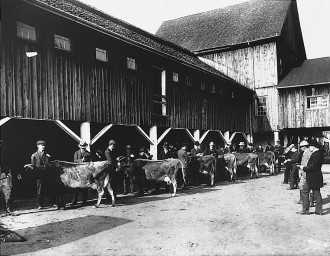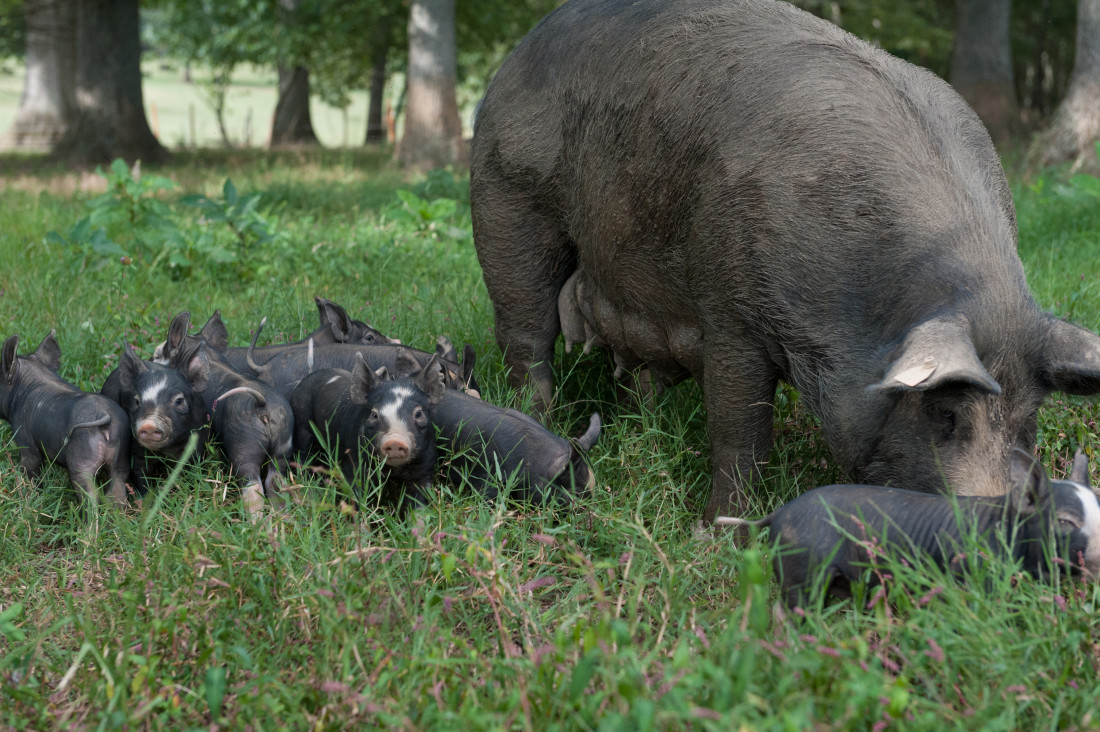Plateau Farm stands atop a ridge on the Biltmore Estate’s west side and includes an eclectic mix of buildings from different time periods. Bill Alexander, Biltmore’s landscape and forest historian, says Plateau Farm was one of several family farms that lined a public road built in the 1850s between the location of current-day Biltmore Village and Bent Creek.
In the shade of the farm’s old oaks, a herd of young Berkshire pigs recently acquired from a heritage breeder in Lexington is foraging for acorns. Inside the barn, a new litter of piglets almost a week old rests in the sawdust near their sow. These are the first purebred Berkshire hogs farrowed on the estate since George Vanderbilt’s Berkshire operation was phased out in 1909.
The pigs signify a larger effort by the Biltmore Estate to honor its agricultural past in a way that also provides local, sustainably raised fare for the 21st-century palates of those dining at its restaurants.
History of heritage hogs
Biltmore first purchased the Berkshire hogs in 1892, and the pig farm included hillside pastures surrounding the Berkshire Cottage, the residence of the manager. “Through 1895, the hogs provided pork primarily for the estate and employees,” Alexander says.
A report on model farms published by the N.C. State Board of Agriculture in 1896 underlined Vanderbilt’s investment in farming techniques. The early agricultural team, headed by George Weston, maintained a system that tracked monthly profit-and-loss statements from each department.
The estate bought additional stock of purebred Berkshires periodically from various sources, even sending a pig breeder to look at stock in England to be shipped to Biltmore. In 1899, the estate purchased a boar named Columbia’s Duke for $500, equivalent to about $14,000 today, according to an internal Biltmore research article.
Within a short time, Biltmore was as famous for what it produced in its landscape nursery, market garden and livestock-breeding programs as it was for its palatial house and grounds. The Biltmore’s reputation for agricultural success grew beyond Western North Carolina; its Berkshire hogs were nationally listed and sought as top certified breed stock. The first commercial sale was held in February 1901, and thereafter, breeders from across the country looked forward to the annual livestock sale at the estate as a major event.
An article in the Atlanta Constitution in 1900 proclaimed the arrival of 21 dairy Jerseys and 36 Berkshire hogs from the Biltmore Estate for an interstate fair in Georgia. “These two famous Biltmore herds have won more prizes than any other two herds of the same breeds in the world. The famous sow Model Princess is with the Berkshire herd. This hog has won first prize in class and sweepstake at every fair at which she has been exhibited this year,” the article states.
After achieving great success, however, the days were numbered for Biltmore’s original hog farm. “By 1903 the operation was expanded and several pebbledash shingled roof buildings were built, although none have survived,” the Biltmore research article states. “The pig farm was closed down in 1912 after Mr. Vanderbilt found it to be unprofitable; unfortunately, the buildings were torn down.”
Hyperlocal sourcing
Ted Katsigianis, Biltmore’s vice president of agriculture, says the estate reintroduced heritage swine several years ago at the request of Biltmore’s chefs. “It was well-received by our guests, and the program was expanded,” he says.

The swine production team experimented with several other heirloom breeds besides Berkshire, such as Hereford, red wattle and Duroc. All of these breeds are known for deposits of fat marbling, which gives the meat a different flavor and tenderness. Ultimately, the team chose Berkshires because of their historic connection to the Vanderbilt family. Biltmore currently has 65 hogs and plans to more than double the operation next year.
The western side of the estate houses most of Biltmore’s livestock, including Black Angus cattle and Dorper sheep herds. It is not open to the public, and all visitors in the agricultural areas must be escorted by a qualified staff member.
Driving between the different farm areas on the western side of the estate, Katsigianis points out sections along the road planted with corn and grasses. “You might see along the verge of the roads there are planted areas that look a bit overgrown,” he says. “These are buffer zones, specifically planted as food and habitat for local birds and wildlife.”
Biltmore’s agriculture management plan includes using the pigs to improve the soil of rotated fields. “This particular area was grazed by pigs after the plot was culled last year. After the winter we’ll put the pigs back in the plot,” Katsigianis says. “We’ve found that it works really well. Any corn that is left over, the pigs harvest. They like to forage, dig up roots, plowing the soil and depositing fertilizer.”
Biltmore applies a similar practice to cultivated fields planted in canola, which the estate raises for use as fryer oil for the restaurants and biodiesel to run many of the estate’s vehicles. Once harvested, farmers must rotate the fields to prevent cereal disease in the crop. Rather than let the field stand fallow, it’s planted like the verges — keeping the vegetation on the field controls the runoff from going into the river.
“It’s called hyperlocal sourcing, when your farm provides your restaurant with the products your farm harvests,” Katsigianis says. “That’s specifically what Biltmore’s focus is on, trying to contain all of the ends: estate-raised vegetables, estate-raised meat, sustainable farming practices, food waste control — those are always our top concerns.”
Biltmore’s current levels of animal herds are comparable to the herd sizes of Vanderbilt’s day. According to Biltmore’s agriculture department, the estate’s various herds are raised specifically for meat production at the estate or sold to other breeders and small farming operations. Livestock at Biltmore includes:
- Cows: 250 brood cows and six bulls. These cows produce 230 live calves each year, of which 50-70 steers are marketed through the estate’s restaurants. All of the females calves and remaining male calves are either retained for breeding or sold to other breeding operations.
- Sheep: 200 brood ewes and eight rams. These ewes produce about 350 lambs each spring. All of the female lambs are retained in the flock or sold to other breeders. About 80 percent of the male lambs are marketed for meat and 20 percent are sold for breeding purposes.
- Chickens: 200-250 heritage-breed, brown-egg-layer hens. Depending on the time of year, the hens produce about 200 eggs a day, with the highest production during the spring, summer and early fall.
- Goats: About 10-15 breeding does. The does produce 15-20 kids per year, all of which are sold for breeding, with a few marketed locally for meat. Goats are used to control brush in some pastures on the estate and for guest interaction at Antler Village.
Field to table
The estate’s tradition of scientific farming methods and self-sustainability is an even larger challenge now that it’s visited by more than 1.5 million visitors annually. Each of those visitors typically eats at least one meal during his or her stay. To keep up with demand, Biltmore’s agriculture and restaurant departments work to strategically incorporate local meat into dishes.
“We tend to focus on providing estate-raised products during the busiest months in our restaurants, April through December, but we have also been incorporating estate-raised pork more often in menus year-round,” says estate Executive Chef Mark DeMarco.
DeMarco says the restaurants will use estate meats in a variety of ways this fall: The Bistro has a braised pork belly on its lunch and dinner menu along with estate beef carpaccio. Cedric’s Tavern uses the estate pork for its signature pork burger at lunch and pork chops at dinner. Stable Café features estate beef in its lunch cheeseburger, and Deerpark Restaurant will have estate hams on its Candlelight Christmas brunch menu.
Eli Herman, Biltmore’s production garden manager, says the garden, livestock farm and restaurants collaborate on planning for menus, discussing “what’s going, what’s coming, and what’s available.” Indicating multiple trays of young herbs stacked in a large greenhouse, he says, “We’re working on doing some custom blends for the kitchens to serve. This one is for the village hotel: lemon, basil, dill and chive. … We can adjust our product to suit the specific needs and requests of our chefs.”

Herman can grow a variety of different crops within a new hydroponic greenhouse and change it to the needs of the kitchens, giving the production garden a greater amount of flexibility. “With the greenhouses, we’re only 30 days from seed to harvest with the salad mixes, and between 10-14 days with the microgreens,” he says. “With a little bit of notice, we can change and start to do custom blends for the Bistro and other restaurants on property to meet their needs virtually within a month for a special menu.”
The quantity of what’s grown on the estate varies based on seasonality of the product and on the requests and needs of its seven sit-down restaurants, according to Marissa Jamison, Biltmore’s public relations manager. “Each chef places orders for their respective restaurant, and those orders are manipulated based on the fixed amount of product that will be available,” she says. “With the introduction of additional hoop houses this year, we are working toward year-round production of microgreens and lettuces, which will supply most of the greens used throughout the estate. We are also close to year-round supply of eggs to our restaurants.”
Jamison says demand far exceeds what Biltmore is able to produce on the estate. “In addition to what we raise in our field-to-table program, we work closely with local and regional farms to source products,” she says.
Herman says the agricultural producers at Biltmore try to look beyond the immediate needs. “We want to think about how sustainable and how environmentally sound this will be for two generations from now,” he says. “This is just a continuation of that forward thinking that the Vanderbilts started here, and we’re not so proud of ourselves to [not] realize that the next generations are going to think of something even better.”



Before you comment
The comments section is here to provide a platform for civil dialogue on the issues we face together as a local community. Xpress is committed to offering this platform for all voices, but when the tone of the discussion gets nasty or strays off topic, we believe many people choose not to participate. Xpress editors are determined to moderate comments to ensure a constructive interchange is maintained. All comments judged not to be in keeping with the spirit of civil discourse will be removed and repeat violators will be banned. See here for our terms of service. Thank you for being part of this effort to promote respectful discussion.